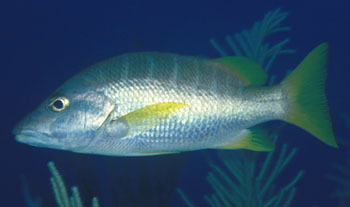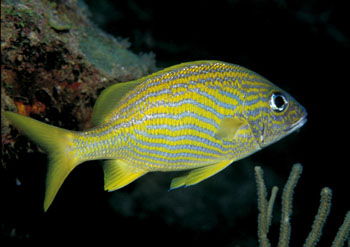|
|
Staff involved:Alasdair Edwards, Peter Mumby (Exeter), Ernesto Arias-Gonzalez (CINVESTAV, Mexico)Funding:National Geographic Society, US World Wildlife Fund, Royal Society
Schoolmaster snapper. Snappers, which are favourite food fish, were found to be over twice as abundant on coral reefs with mangrove nurseries nearby.
The French grunt, whose numbers were 3 times greater on coral patch reefs and the shallow reef front when mangrove nursery areas were present. |
Mangroves enhance coral reef fish biomass in the CaribbeanProjectMangrove forests are one of the World's most threatened tropical ecosystems with global loss exceeding 35%. Juvenile coral reef fishes often inhabit mangroves but the importance of these nurseries to reef fish population dynamics has not been quantified. Indeed, mangroves might be expected to have negligible influence on reef fish communities: juvenile fish can inhabit alternative habitats and fish populations may be regulated by other limiting factors such as larval supply or fishing. We set out to test how important mangrove nurseries were to coral reef fish communities by studying fish on three atolls with extremely limited mangroves (three 'mangrove-scarce' systems), and one mangrove dominated atoll and two areas of the offshore barrier reef which had extensive offshore mangrove islands behind (three 'mangrove-rich' systems). All systems were 25-80 km offshore along the coasts of Belize and Mexico and had similar-sized areas of seagrass beds and reef. The research, which involved visual surveys of some 100,000 fish from 164 species over 6 weeks, showed that mangroves are surprisingly important, serving as an intermediate nursery habitat that may increase the survivorship of young fish. We also found that mangrove presence strongly influence the community structure of fish on neighbouring coral reefs. Moreover, the biomass of several commercially-important species of snappers (Lutjanidae) and grunts (Haemulidae) was more than doubled when adult habitat was connected to mangroves. We only recorded juveniles of the Rainbow parrotfish Scarus guacamaia, (the largest herbivorous fish in the Atlantic) in mangroves. This explained why, although its numbers have recovered considerably from overfishing in the 1970s at other sites in Belize, at Glover's Reef where mangrove was cleared in the late 1960s and early 1970s it is now locally extinct. Schools of this fish were commonly observed there in the 1960s. SignificanceWe show that extensive mangrove habitats can enhance the biomass of fishes on Caribbean reefs because tropical coastal ecosystems are functionally linked. Although precise corridors of connectivity between habitats are not yet fully understood, our results have an important implication for conservation planning: management schemes should explicitly protect swaths of connected habitats rather than simply identify representative areas of each habitat in isolation. Given the ever-increasing range and severity of natural and anthropogenic disturbances to coral reefs, any natural source of ecosystem production and resilience should be conserved. Our data suggest that the current rate of mangrove deforestation, which is greatest in the Americas at 2251 km2 yr-1 and exceeds that of tropical rainforests, will have significant deleterious consequences for the functioning, fisheries, biodiversity and resilience of Caribbean coral reefs. Future directionsFurther research is needed to find out precisely how the nursery and adult habitats are connected. Meanwhile, conservation efforts should protect connected corridors of mangroves, seagrass beds and coral reefs and not consider these habitats in isolation. References
|

